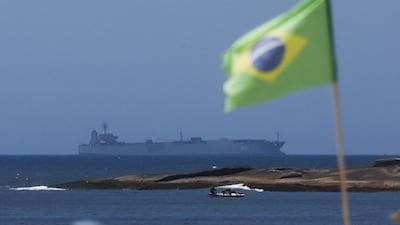The arrival this week to Rio de Janeiro of two Iranian warships that Brazil’s government authorised to dock has prompted rebukes both from Israel and the US.
“Israel sees the docking of Iranian warships in Brazil a few days ago, as a dangerous and regretful development,” Lior Haiat, Israel’s Foreign Ministry spokesman, wrote Thursday on Twitter.
“Brazil should not grant any prize to a malign state,” he said.
Mr Haiat’s comments followed others the day before by the US State Department spokesman Ned Price.
In response to a reporter’s question about the ships reaching Brazil, Mr Price said that Washington is discussing the issue with Brazilian partners and that it wants to ensure Iran “is not able to acquire a foothold, is not able to take advantage of others in our hemisphere”.
“It is certainly not the case that the Brazilian government, the Brazilian people would want to do anything that would assist, that would aid a government, a regime that is responsible for a brutal crackdown and violent repression against its own people,” he added.
On Thursday, one of the two ships was spotted offshore Rio’s world-famous south zone of beaches, while the other was docked downtown. The IRIS Makran and IRIS Dena ships are authorised to stay in Rio until March 4.
The US Department of the Treasury’s Office of Foreign Assets Control last month designated both ships for sanctions.
Brazil’s Foreign Ministry did not immediately respond to a request for comment from AP on the statements from the Israeli and American officials.
The trip by the Iranian navy comes amid heightened tensions between Tehran and the West over the collapse of its 2015 nuclear deal with world powers and as the Islamic Republic enriches uranium to its closer than ever to weapons-grade levels.
Iranian officials have portrayed the trip as challenging America’s influence in its own backyard — long a point of contention as Tehran continually criticises the presence of the US Navy’s 5th Fleet in the region, which patrols the Arabian Gulf and its narrow mouth, the strategic Strait of Hormuz.
The state-run IRNA news agency quoted Iranian navy commander Rear Admiral Shahram Irani in January as saying that “the Islamic Republic is not present in two strategic straits on the planet, but in the current year, the Iranians plan to have a presence in one of them, which is the Panama Canal”.
State media has described the trip as challenging American “hegemony.”
Iran also faces nationwide protests and anger after the September death of Masha Amini, a woman who died after being detained by the country’s morality police.
In the time since those demonstrations, Tehran has tried to flex its military elsewhere as well. Tehran has supplied drones to Russia that killed Ukrainian civilians, run drills in a border region with Azerbaijan and bombed Kurdish positions in Iraq.
Brazil’s President Luiz Inacio Lula da Silva made international diplomacy a feature of his second presidential term, which ended in 2010. That included attempting to broker a nuclear deal between the US and Iran during his second presidential term that same year, though talks ran aground.
In a statement on Tuesday, US Senator Ted Cruz noted that the US has already sanctioned the two Iranian warships, and Rio de Janeiro’s port and any Brazilian service providers are now at risk of sanctions.
“The Biden administration is obligated to impose relevant sanctions, re-evaluate Brazil’s co-operation with U.S. antiterrorism efforts, and re-examine whether Brazil is maintaining effective antiterrorism measures at its ports,” Mr Cruz said.

